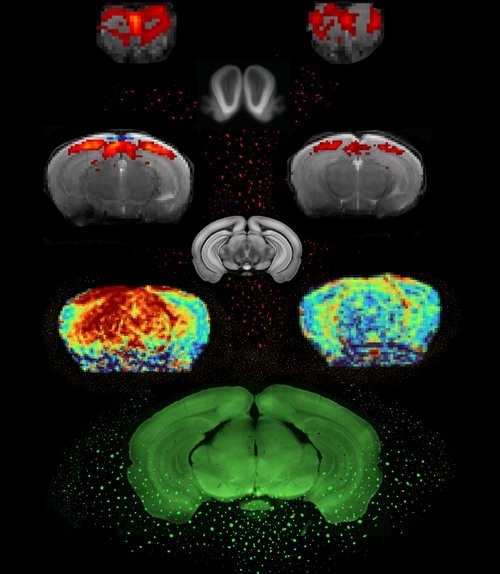GE Healthcare to Distribute Gamma Medica-Ideas Preclinical Imaging Systems
|
By MedImaging staff writers Posted on 29 Jul 2008 |
Gamma Medica-Ideas (GM-I; Northridge, CA, USA) and GE Healthcare (Chalfont St. Giles, UK) announced at the 55th annual meeting of the Society of Nuclear Medicine, held in New Orleans, LA, USA, in June 2008, that GE Healthcare will be the exclusive distributor of Gamma Medica-Ideas' preclinical imaging systems effective July 1, 2008.
Pre-Clinical imaging plays a key role in new pharmaceutical therapeutic development by allowing researchers to visualize the structure, function, and response of laboratory animals in vivo. The agreement complements GE Healthcare's range of preclinical products, and grants researchers greater access to GM-I's digital trimodality positron emission tomography (PET), single photon emission computed tomography (SPECT), and computed tomography (CT) scanners.
"This agreement is an opportunity for customers to gain greater access to our hybrid scanners by leveraging the extensive footprint of GE Healthcare,” said Bradley Patt, Ph.D., president and CEO of GM-I. "We were first to market a trimodal preclinical scanner, and our all-digital technology provides improved spatial resolution, while enabling researchers to share images easily-bringing digital pathology to the preclinical arena.”
Gamma Medica-Ideas have installed more than 50 multimodality systems on four continents since 2002. The company's first-to-market all-digital technologies have made it a leader in preclinical imaging systems. "GE Healthcare is excited to be working with Gamma Medica-Ideas,” said Gene Saragnese, vice president and general manager, molecular imaging and CT, GE Healthcare. "This agreement underscores our deep commitment to the molecular imaging and preclinical markets. Many innovations in clinical imaging get their start in the preclinical devices, and we continue to look to that space as a showcase for what's possible for the future of human PET, SPECT, and CT imaging.”
GE Healthcare already provides dual-modality PET/CT, cadmium zinc telluride- (CZT)-based SPECT/CT and dedicated in vivo and specimen preclinical CT scanners. The agreement with GM-I brings scaleable and upgradeable trimodal (PET/SPECT/CT) systems under the GE umbrella.
"Researchers across the globe will reap the benefits of the combined multimodality pre-clinical portfolio of GE Healthcare and Gamma Medica-Ideas accelerating studies to investigate disease biology and develop new drugs,” said James Mitchell, general manager, molecular imaging technologies, GE Healthcare. "This agreement makes for a one-stop-shop for pre-clinical imaging devices.”
Gamma Medica-Ideas (GM-I) designs, builds, and services imaging systems based on novel technologies to improve patient health through early diagnosis of disease, improved patient treatment and by enabling new drug discovery. The company's core digital imaging technologies also hold great promise for a new class of solutions for the safety and security markets. In the pre-clinical space, GM-I's FLEX Triumph imaging platform is marketed for medical research and drug development. The FLEX Triumph system combines the PET (X-PET or its new digital LabPET), SPECT (X-SPECT), and CT (X-O) modalities in the world's first trimodality system. In the clinical space, GM-I offers LumaGEM, its dual-headed Molecular Breast Imaging- (MBI)-based system for early diagnosis and treatment of breast cancer. The digital gamma ray imaging technology in LumaGEM provides significant advances in resolution and contrast, which has allowed for identification of millimeter-sized breast cancers missed by mammography, particularly in women with dense breast tissue.
Related Links:
GE Healthcare
Gamma Medica-Ideas
Pre-Clinical imaging plays a key role in new pharmaceutical therapeutic development by allowing researchers to visualize the structure, function, and response of laboratory animals in vivo. The agreement complements GE Healthcare's range of preclinical products, and grants researchers greater access to GM-I's digital trimodality positron emission tomography (PET), single photon emission computed tomography (SPECT), and computed tomography (CT) scanners.
"This agreement is an opportunity for customers to gain greater access to our hybrid scanners by leveraging the extensive footprint of GE Healthcare,” said Bradley Patt, Ph.D., president and CEO of GM-I. "We were first to market a trimodal preclinical scanner, and our all-digital technology provides improved spatial resolution, while enabling researchers to share images easily-bringing digital pathology to the preclinical arena.”
Gamma Medica-Ideas have installed more than 50 multimodality systems on four continents since 2002. The company's first-to-market all-digital technologies have made it a leader in preclinical imaging systems. "GE Healthcare is excited to be working with Gamma Medica-Ideas,” said Gene Saragnese, vice president and general manager, molecular imaging and CT, GE Healthcare. "This agreement underscores our deep commitment to the molecular imaging and preclinical markets. Many innovations in clinical imaging get their start in the preclinical devices, and we continue to look to that space as a showcase for what's possible for the future of human PET, SPECT, and CT imaging.”
GE Healthcare already provides dual-modality PET/CT, cadmium zinc telluride- (CZT)-based SPECT/CT and dedicated in vivo and specimen preclinical CT scanners. The agreement with GM-I brings scaleable and upgradeable trimodal (PET/SPECT/CT) systems under the GE umbrella.
"Researchers across the globe will reap the benefits of the combined multimodality pre-clinical portfolio of GE Healthcare and Gamma Medica-Ideas accelerating studies to investigate disease biology and develop new drugs,” said James Mitchell, general manager, molecular imaging technologies, GE Healthcare. "This agreement makes for a one-stop-shop for pre-clinical imaging devices.”
Gamma Medica-Ideas (GM-I) designs, builds, and services imaging systems based on novel technologies to improve patient health through early diagnosis of disease, improved patient treatment and by enabling new drug discovery. The company's core digital imaging technologies also hold great promise for a new class of solutions for the safety and security markets. In the pre-clinical space, GM-I's FLEX Triumph imaging platform is marketed for medical research and drug development. The FLEX Triumph system combines the PET (X-PET or its new digital LabPET), SPECT (X-SPECT), and CT (X-O) modalities in the world's first trimodality system. In the clinical space, GM-I offers LumaGEM, its dual-headed Molecular Breast Imaging- (MBI)-based system for early diagnosis and treatment of breast cancer. The digital gamma ray imaging technology in LumaGEM provides significant advances in resolution and contrast, which has allowed for identification of millimeter-sized breast cancers missed by mammography, particularly in women with dense breast tissue.
Related Links:
GE Healthcare
Gamma Medica-Ideas
Latest Industry News News
- GE HealthCare and NVIDIA Collaboration to Reimagine Diagnostic Imaging
- Patient-Specific 3D-Printed Phantoms Transform CT Imaging
- Siemens and Sectra Collaborate on Enhancing Radiology Workflows
- Bracco Diagnostics and ColoWatch Partner to Expand Availability CRC Screening Tests Using Virtual Colonoscopy
- Mindray Partners with TeleRay to Streamline Ultrasound Delivery
- Philips and Medtronic Partner on Stroke Care
- Siemens and Medtronic Enter into Global Partnership for Advancing Spine Care Imaging Technologies
- RSNA 2024 Technical Exhibits to Showcase Latest Advances in Radiology
- Bracco Collaborates with Arrayus on Microbubble-Assisted Focused Ultrasound Therapy for Pancreatic Cancer
- Innovative Collaboration to Enhance Ischemic Stroke Detection and Elevate Standards in Diagnostic Imaging
- RSNA 2024 Registration Opens
- Microsoft collaborates with Leading Academic Medical Systems to Advance AI in Medical Imaging
- GE HealthCare Acquires Intelligent Ultrasound Group’s Clinical Artificial Intelligence Business
- Bayer and Rad AI Collaborate on Expanding Use of Cutting Edge AI Radiology Operational Solutions
- Polish Med-Tech Company BrainScan to Expand Extensively into Foreign Markets
- Hologic Acquires UK-Based Breast Surgical Guidance Company Endomagnetics Ltd.
Channels
Radiography
view channel
Machine Learning Algorithm Identifies Cardiovascular Risk from Routine Bone Density Scans
A new study published in the Journal of Bone and Mineral Research reveals that an automated machine learning program can predict the risk of cardiovascular events and falls or fractures by analyzing bone... Read more
AI Improves Early Detection of Interval Breast Cancers
Interval breast cancers, which occur between routine screenings, are easier to treat when detected earlier. Early detection can reduce the need for aggressive treatments and improve the chances of better outcomes.... Read more
World's Largest Class Single Crystal Diamond Radiation Detector Opens New Possibilities for Diagnostic Imaging
Diamonds possess ideal physical properties for radiation detection, such as exceptional thermal and chemical stability along with a quick response time. Made of carbon with an atomic number of six, diamonds... Read moreMRI
view channel
Simple Brain Scan Diagnoses Parkinson's Disease Years Before It Becomes Untreatable
Parkinson's disease (PD) remains a challenging condition to treat, with no known cure. Though therapies have improved over time, and ongoing research focuses on methods to slow or alter the disease’s progression,... Read more
Cutting-Edge MRI Technology to Revolutionize Diagnosis of Common Heart Problem
Aortic stenosis is a common and potentially life-threatening heart condition. It occurs when the aortic valve, which regulates blood flow from the heart to the rest of the body, becomes stiff and narrow.... Read moreUltrasound
view channel
New Incision-Free Technique Halts Growth of Debilitating Brain Lesions
Cerebral cavernous malformations (CCMs), also known as cavernomas, are abnormal clusters of blood vessels that can grow in the brain, spinal cord, or other parts of the body. While most cases remain asymptomatic,... Read more.jpeg)
AI-Powered Lung Ultrasound Outperforms Human Experts in Tuberculosis Diagnosis
Despite global declines in tuberculosis (TB) rates in previous years, the incidence of TB rose by 4.6% from 2020 to 2023. Early screening and rapid diagnosis are essential elements of the World Health... Read moreNuclear Medicine
view channel
New Imaging Approach Could Reduce Need for Biopsies to Monitor Prostate Cancer
Prostate cancer is the second leading cause of cancer-related death among men in the United States. However, the majority of older men diagnosed with prostate cancer have slow-growing, low-risk forms of... Read more
Novel Radiolabeled Antibody Improves Diagnosis and Treatment of Solid Tumors
Interleukin-13 receptor α-2 (IL13Rα2) is a cell surface receptor commonly found in solid tumors such as glioblastoma, melanoma, and breast cancer. It is minimally expressed in normal tissues, making it... Read moreGeneral/Advanced Imaging
view channel
First-Of-Its-Kind Wearable Device Offers Revolutionary Alternative to CT Scans
Currently, patients with conditions such as heart failure, pneumonia, or respiratory distress often require multiple imaging procedures that are intermittent, disruptive, and involve high levels of radiation.... Read more
AI-Based CT Scan Analysis Predicts Early-Stage Kidney Damage Due to Cancer Treatments
Radioligand therapy, a form of targeted nuclear medicine, has recently gained attention for its potential in treating specific types of tumors. However, one of the potential side effects of this therapy... Read moreImaging IT
view channel
New Google Cloud Medical Imaging Suite Makes Imaging Healthcare Data More Accessible
Medical imaging is a critical tool used to diagnose patients, and there are billions of medical images scanned globally each year. Imaging data accounts for about 90% of all healthcare data1 and, until... Read more






















